Gita on Ego Death: The End of Who You Thought You Were
Noopur Kumari | Jul 19, 2025, 11:00 IST
( Image credit : Times Life Bureau )
The roles that we live our lives to create, our name, our occupation, our relationship. But then, what about the same self which we are protecting so much? What if the self itself is not real? It does not speak about getting rid of the ego in the Bhagavad Gita, but breaks it. In this article, we shall explore the meaning of ego death extensively together with how the Gita works through it, a painful yet freeing experience as well as how it may be the most healing experience ever encountered.
In our heads we all have a story to say, I am this. Do that I do. I have achieved this. I allow that,”. What happens however when that whole story falls one day? It’s terrifying. Death seems to present itself. But there is no death there, only that death of illusion of who you were. Through its divine knowledge, the Bhagavad Gita inculcates the idea that ego death is not a destruction. It’s rebirth. Due to the breakdown of Arjuna and the wisdom given by Krishna we come to learn that having no ego is not a sign of weakness but the start of a real power, peace and an eternal union with the soul.
न जायते म्रियते वा कदाचिन् । नायं भूत्वा भविता वा न भूय:।अजो नित्य: शाश्वतोऽयं पुराणो न हन्यते हन्यमाने शरीरे॥
1.
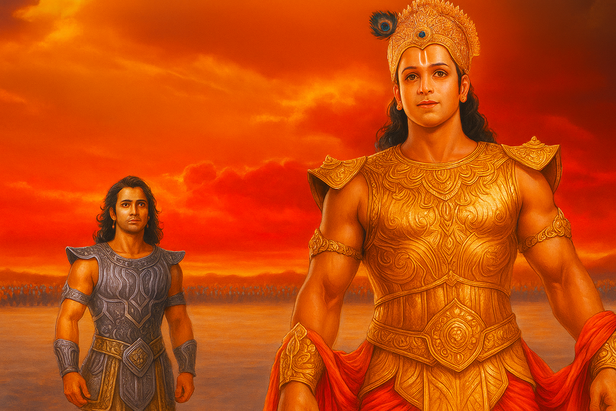
Ego death is not a spiritual coolness factor, but extremely profound as a psychological breakdown of the false person we hold onto. Krishna informs Arjuna in Gita that the self he feels he is familiar with, his sense of warrior pride, his relations, even his position in society, is temporal. In Chapter 2, Krishna tells Arjuna that he is mourning those whom he should not mourn; it is ego-tied attachments. The process of ego death starts once we acknowledge that we are none of what is associated with ourselves; that we are not our bodies, our names, or our titles. We are the soul--a something, always the same, staying forever beyond success and or failure.
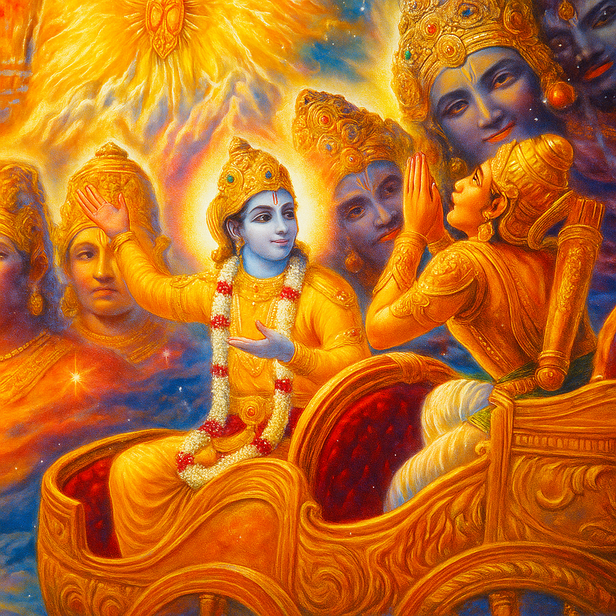
When Arjun throws down his bow, shaking in despair he is not being weak. He is experiencing ego death. At long last the mighty warrior acknowledges: “I don’t know what is right.” That instant in it all is the sacred helplessness. It is the crack of the ego. There in that vulnerability, there is a place for Krishna’s God-consciousness. Ego death usually starts when we crashed into the wall, a heartbreak, a failure and we can’t keep up with the illusion control in anymore. Just as Arjuna our lowest point is our turning point.
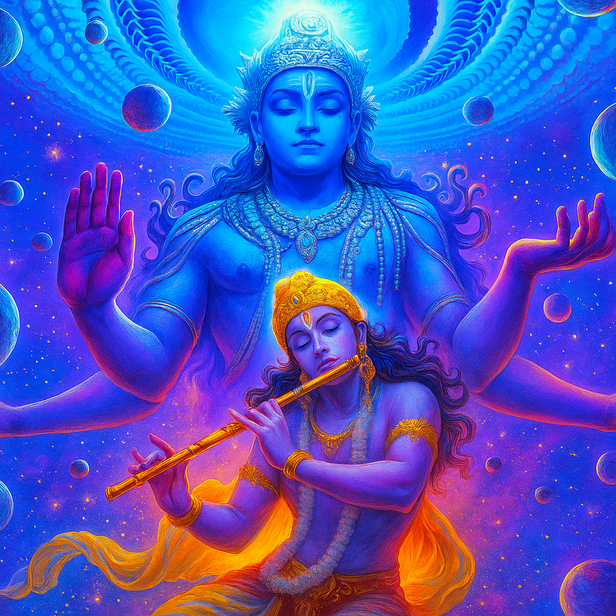
In a very soft but strong tone, Krishna reminds Arjuna and says to him, to, You have a right to the work and not to its fruits. This is what ego death is all about. We think we are valuable depending on what we have accomplished. The Gita, however, teaches: Act in karma without any attachment. It is the ego saying, that I have attained this. The soul responds, I presented my actions through love. As long as we shed off the demands of being praised, validated, or at least getting a result, we will start behaving out of complete self-awareness or our blissful natures, not insecurity or ego.
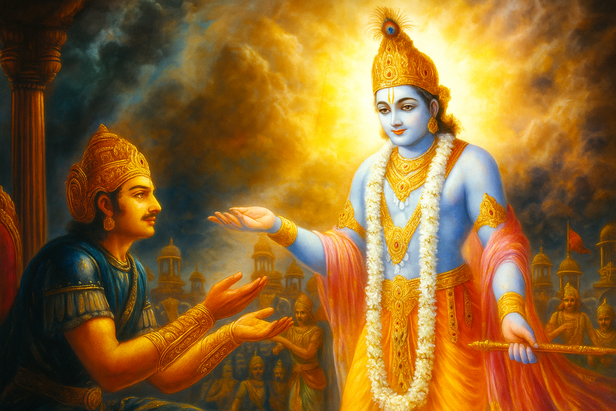
The ego desires to direct all aspects, both people and events as well as emotions. However, this is not how life functions. Krishna teaches us that there is no control. One who is neither agitated by good and pain. is fit to attain liberation.” The ego strives not to suffer but to hold on to pleasure. Yet the soul, being founded in wisdom, watches both impartially. It is not the same as giving up or leaving it behind but the relinquishment of the illusion that we are the doer, the controller, the center of the universe.
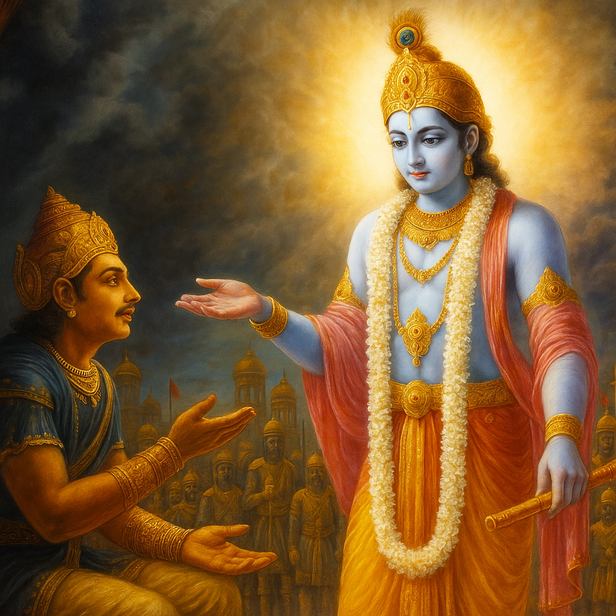
We lose our identity without our place of work, marital status and our names. But Gita reveals to us another aspect. According to Krishna, the soul does not get birth or dies. Neither all labels should be taken away, only what will be left is pure consciousness-awareness, love, presence. Ego death does not issue in being something nothing. It implies going back to all things. It involves the understanding that we never used to be this body-mind complex. We are part of the same divine ocean and we are one, we will never be separate.
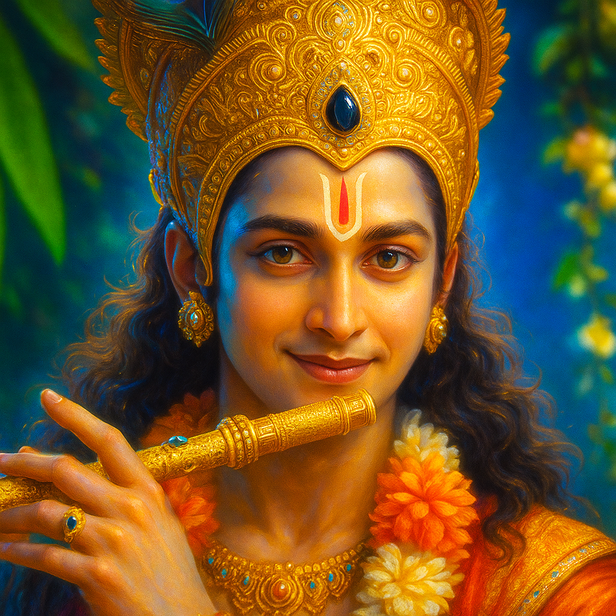
Surrender is like giving up to the ego. However, Gita gives a new definition of the surrender: You have to abandon all kinds of religion and simply serve Me. I will rescue you from every sinful response. Fear not.” Not at all is this a demand--it is a promise. When the soul prevails there is the surrender of the ego. We are out of fear, comparison and anger. We all are in flow. We are coexisting in peace. This is the last death of ego the time when we believe in something more significant than we are.
Don not fear fears man. Your name is not you. Neither is your broken past, nor your glittering resume, you. All these are the possessions of the story of the ego--and stories come to an end. But thou-- the soul -remainest. This is the best message of Gita. As ego is killed, love is created. The result of loss of identity is the truth. When you give up, you are not giving up. You are just flying.
Explore the latest trends and tips in Health & Fitness, Spiritual, Travel, Life Hacks, Trending, Fashion & Beauty, and Relationships at Times Life!
न जायते म्रियते वा कदाचिन् । नायं भूत्वा भविता वा न भूय:।अजो नित्य: शाश्वतोऽयं पुराणो न हन्यते हन्यमाने शरीरे॥
1. What Is Ego Death , According to the Gita?

Ego
( Image credit : Times Life Bureau )
Ego death is not a spiritual coolness factor, but extremely profound as a psychological breakdown of the false person we hold onto. Krishna informs Arjuna in Gita that the self he feels he is familiar with, his sense of warrior pride, his relations, even his position in society, is temporal. In Chapter 2, Krishna tells Arjuna that he is mourning those whom he should not mourn; it is ego-tied attachments. The process of ego death starts once we acknowledge that we are none of what is associated with ourselves; that we are not our bodies, our names, or our titles. We are the soul--a something, always the same, staying forever beyond success and or failure.
2. Arjuna’s Breakdown Was the Beginning of His Awakening

Arjuna
( Image credit : Times Life Bureau )
When Arjun throws down his bow, shaking in despair he is not being weak. He is experiencing ego death. At long last the mighty warrior acknowledges: “I don’t know what is right.” That instant in it all is the sacred helplessness. It is the crack of the ego. There in that vulnerability, there is a place for Krishna’s God-consciousness. Ego death usually starts when we crashed into the wall, a heartbreak, a failure and we can’t keep up with the illusion control in anymore. Just as Arjuna our lowest point is our turning point.
3. Letting Go of “I Did This” and “I Deserve That

Krishna
( Image credit : Times Life Bureau )
In a very soft but strong tone, Krishna reminds Arjuna and says to him, to, You have a right to the work and not to its fruits. This is what ego death is all about. We think we are valuable depending on what we have accomplished. The Gita, however, teaches: Act in karma without any attachment. It is the ego saying, that I have attained this. The soul responds, I presented my actions through love. As long as we shed off the demands of being praised, validated, or at least getting a result, we will start behaving out of complete self-awareness or our blissful natures, not insecurity or ego.
4. The Illusion of Control: How Ego Keeps Us Chained

Krishna
( Image credit : Times Life Bureau )
The ego desires to direct all aspects, both people and events as well as emotions. However, this is not how life functions. Krishna teaches us that there is no control. One who is neither agitated by good and pain. is fit to attain liberation.” The ego strives not to suffer but to hold on to pleasure. Yet the soul, being founded in wisdom, watches both impartially. It is not the same as giving up or leaving it behind but the relinquishment of the illusion that we are the doer, the controller, the center of the universe.
5. Who Am I Without My Story?

Krishna
( Image credit : Times Life Bureau )
We lose our identity without our place of work, marital status and our names. But Gita reveals to us another aspect. According to Krishna, the soul does not get birth or dies. Neither all labels should be taken away, only what will be left is pure consciousness-awareness, love, presence. Ego death does not issue in being something nothing. It implies going back to all things. It involves the understanding that we never used to be this body-mind complex. We are part of the same divine ocean and we are one, we will never be separate.
6. Surrender Is Not Defeat—It’s Freedom

Gita, Krishna
( Image credit : Times Life Bureau )
Surrender is like giving up to the ego. However, Gita gives a new definition of the surrender: You have to abandon all kinds of religion and simply serve Me. I will rescue you from every sinful response. Fear not.” Not at all is this a demand--it is a promise. When the soul prevails there is the surrender of the ego. We are out of fear, comparison and anger. We all are in flow. We are coexisting in peace. This is the last death of ego the time when we believe in something more significant than we are.
Ego Death Is Not the End. It’s the Beginning
Explore the latest trends and tips in Health & Fitness, Spiritual, Travel, Life Hacks, Trending, Fashion & Beauty, and Relationships at Times Life!
